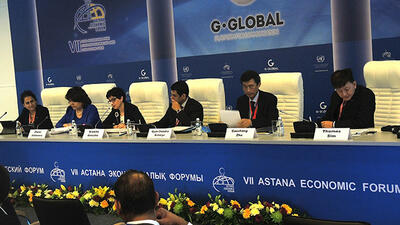SMEs in LDCs, services exports and women business owners (en)
The key question during ‘LDCs: integrating SMEs into global value chains’ how best to integrate SMEs into global value chains, had in fact been an on-going underlying theme throughout the first two days of WEDF.
Panellists nevertheless argued that a first step is getting multinational corporations to invest in LDCs. The second challenge is to then strengthen SMEs, so they can supply global value chains, which are generally controlled by multinational companies.
The audience hear that an issue of great importance, particularly to LDCs, is the ability to attract investment into productive sectors, given that global value chains are mostly governed by multinationals. Furthermore, Governments have an important role in assisting SMEs in improving their productivity, efficiency and quality in order to be able to access markets and integrate into global value chains.
It was also argued that weak SMEs need to be strengthened in domestic markets before being integrated into regional and eventually international supply chains. There is also a mutual interest between large sourcing companies and SME suppliers in building a strong supply chain. The rationale for this is not philanthropy but business motives, the panellists agreed, but having competitive suppliers is in the interest of the buying companies.
During ‘How to promote services sector exports and innovation’, the panellists concluded that public awareness and knowledge about the service industry does not reflect its significance in terms of growth and employment generation. Diagnosing export problems of the service sector is easier, but delivering solutions is more complex. In trade in services, clients demand agile solutions.
Panellists agreed that national trade promotion organizations (TPOs) and other trade support institutions (TSIs) have a vital role to play in raising the profile of the industry, forging business coalitions and promoting services abroad by positioning and branding the industry. They also observed that the service industry depends greatly on human resources: attracting talent is a key issue in moving up the value chain, and the talent pool has to grow in order to for a country to scale up. Infrastructure and the business environment are also of critical importance to boost the industry.
The third afternoon parallel session, ‘Increasing women business owners’ share of corporate and government procurement to meet development objectives’, heard that unlocking corporate and government procurement for women-owned businesses is a way to use trade as a vehicle for development. Government procurement represents, on average, 15%-20% of GDP. Fortune 500 companies spend US$ 6m per day on indirect purchasing. Yet sourcing from women entrepreneurs is a largely unexplored area, although corporations and governments are beginning to unlock these significant opportunities.
Panellists concluded that strong linkages between foreign direct investment and the domestic private sector are necessary to promote local procurement, including procurement from SMEs especially women-owned enterprises. Women entrepreneurs and corporate buyers should be focused, flexible and unafraid to start small, they said. In addition, women have a great opportunity in high-end, low-volume and other niche markets. But the panellists also emphasized that women entrepreneurs can benefit greatly from open, fair government procurement processes. To achieve this, they should lobby their governments for reform to ensure transparency in procurement.
Read the full summary from ‘LDCs: integrating SMEs into global value chains’.
Read the full summary from ‘How to promote services sector exports and innovation’.
Read the full summary from ‘Increasing women business owners’ share of corporate and government procurement to meet development objectives’.





